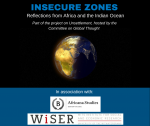Part of the project on Unsettlement, an initiative of the CGT
This joint workshop constitutes the inaugural event in the new program of ‘Critical Concepts and Regional Issues’ of the Project on ‘Unsettlement’, hosted by the Committee on Global Thought at Columbia University, and co-sponsored by the Wits Institute for Social and Economic Research (WISER), and the Department of Africana Studies at Barnard College.

The project on Unsettlement was founded to address the predicament of those who, today, are stranded in states of indefinite displacement, deferred arrival and recurrent departure – people who live in places that lack infrastructures of permanence, but who must reside there for years, decades and even generations. They are often on the move, but lack the freedom and rights of mobility. Unsettlement in this sense is not merely a question of migrancy, and the project is impelled by the need to generate concepts and forms of practice that move beyond that discourse and the associated assumptions of transition. It aims to address the duration, intensity and uncertainty of long-term displacement, while moving beyond oppositions between voluntary and involuntary movement, on one hand, and economic or material exigency versus economic desire on the other.
An online roundtable convened by Rosalind Morris
with Euclides Gonçalves, Mpho Matsipa, Isabel Hofmeyr, Yvette Christianse, Achille Mbembe, and Johannes Machinya
The Project on Unsettlement is excited to partner with WISER, and to join its efforts to reformulate the category of region in Africa and the Indian Ocean.